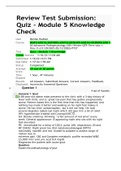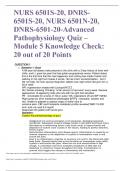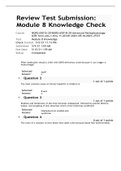Nurs 6501s 20 - Study guides, Class notes & Summaries
Looking for the best study guides, study notes and summaries about Nurs 6501s 20? On this page you'll find 8 study documents about Nurs 6501s 20.
All 8 results
Sort by

-
NURS 6501S-20, DNRS-6501S-20, NURS 6501N-20, DNRS-6501-20-Advanced Pathophysiology Quiz - Module 5 Knowledge
- Exam (elaborations) • 10 pages • 2022
-
- $15.49
- + learn more
1. Question: Explain the pathophysiology of gout. 2. Question: Explain why a patient with gout is more likely to develop renal calculi. 3. Question: Discuss what is osteoporosis and how does it develop pathologically? 4. Question: The pt. had various symptoms, explain how these factors are associated with RA and what is the difference between RA and OA? 5. Question: Describe what is MS and how did it cause the above patient’s symptoms?

-
NURS 6501S-20, DNRS-6501S-20, NURS 6501N-20, DNRS-6501-20-Advanced Pathophysiology Quiz - Module 5 Knowledge (20 Points Jan 2022).docx
- Exam (elaborations) • 1 pages • 2022
-
- $16.49
- + learn more
1. Question: Explain the pathophysiology of gout. 2. Question: Explain why a patient with gout is more likely to develop renal calculi. 3. Question: Discuss what is osteoporosis and how does it develop pathologically? 4. Question: The pt. had various symptoms, explain how these factors are associated with RA and what is the difference between RA and OA? 5. Question: Describe what is MS and how did it cause the above patient’s symptoms?

-
NURS 6501S-20, DNRS-6501S-20, NURS 6501N-20, DNRS-6501-20-Advanced Pathophysiology Quiz - Module 5 Knowledge
- Exam (elaborations) • 1 pages • 2022
-
- $17.49
- + learn more
1. Question: Explain the pathophysiology of gout. 2. Question: Explain why a patient with gout is more likely to develop renal calculi. 3. Question: Discuss what is osteoporosis and how does it develop pathologically? 4. Question: The pt. had various symptoms, explain how these factors are associated with RA and what is the difference between RA and OA? 5. Question: Describe what is MS and how did it cause the above patient’s symptoms?

-
NURS 6501S-20, DNRS-6501S-20, NURS 6501N-20, DNRS-6501-20-Advanced Pathophysiology Quiz - Module 5 Knowledge (Score; 20 Points Jan22).docx
- Exam (elaborations) • 1 pages • 2023
-
- $18.49
- + learn more
1. Question:A 68-year-old obese male presents to the clinic with a 3-day history of fever with chills, and Lt. great toe pain that has gotten progressively worse. Patient states this is the first time that this has happened, and nothing has made it better and walking on his right foot makes it worse. He has tried acetaminophen, but it did not help. He took several ibuprofen tablets last night which did give him a bit of relief. HPI: hypertension treated with Lisinopril/HCTZ . SH: Denies smokin...

-
NURS 6501S-20, DNRS-6501S-20, NURS 6501N-20, DNRS-6501-20-Advanced Pathophysiology Quiz – Module 5 Knowledge Check
- Exam (elaborations) • 7 pages • 2023
-
- $10.49
- + learn more
NURS 6501S-20, DNRS-6501S-20, NURS 6501N-20, DNRS-6501-20-Advanced Pathophysiology Quiz – Module 5 Knowledge Check A 68-year-old obese male presents to the clinic with a 3-day history of fever with chills, and Lt. great toe pain that has gotten progressively worse. Patient states this is the first time that this has happened, and nothing has made it better and walking on his right foot makes it worse. He has tried acetaminophen, but it did not help. He took several ibuprofen tablets last nigh...

-
NURS-6501S-20/NURS-6501N-20-Advanced Pathophysiology- QTR-Term-wks-1-thru-11 Module 8 Knowledge Check
- Exam (elaborations) • 4 pages • 2022
-
- $9.99
- + learn more
NURS-6501S-20/NURS-6501N-20-Advanced Pathophysiology- QTR-Term-wks-1-thru-11 Module 8 Knowledge Check 1. What medication should a child with G6PD deficiency avoid because it can trigger a hemorrhage? 2. Redness and tenderness of skin that becomes widespread, followed by painful blisters, bullae, and sloughing of skin describes which of the following conditions? 3. The urine of a neonate is more dilute than adult urine because blood flow preferentially goes to nephons with short loops. 4. T...

-
NURS 6501S-20, DNRS-6501S-20, NURS 6501N-20, DNRS-6501-20-Advanced Pathophysiology Quiz - Module 5 Knowledge (Score; 20 Points Jan22).docx
- Exam (elaborations) • 1 pages • 2022
-
- $15.49
- + learn more
1. Question:A 68-year-old obese male presents to the clinic with a 3-day history of fever with chills, and Lt. great toe pain that has gotten progressively worse. Patient states this is the first time that this has happened, and nothing has made it better and walking on his right foot makes it worse. He has tried acetaminophen, but it did not help. He took several ibuprofen tablets last night which did give him a bit of relief. HPI: hypertension treated with Lisinopril/HCTZ . SH: Denies smokin...

-
NURS 6501S-20, DNRS-6501S-20, NURS 6501N-20, DNRS-6501-20-Advanced Pathophysiology Quiz - Module 5 Knowledge (20 Points Jan 2022)
- Exam (elaborations) • 1 pages • 2022
-
- $16.24
- + learn more
1. Question: Explain the pathophysiology of gout. 2. Question: Explain why a patient with gout is more likely to develop renal calculi. 3. Question: Discuss what is osteoporosis and how does it develop pathologically? 4. Question: The pt. had various symptoms, explain how these factors are associated with RA and what is the difference between RA and OA? 5. Question: Describe what is MS and how did it cause the above patient’s symptoms?

Study stress? For sellers on Stuvia, these are actually golden times. KA-CHING! Earn from your study resources too and start uploading now. Discover all about earning on Stuvia


